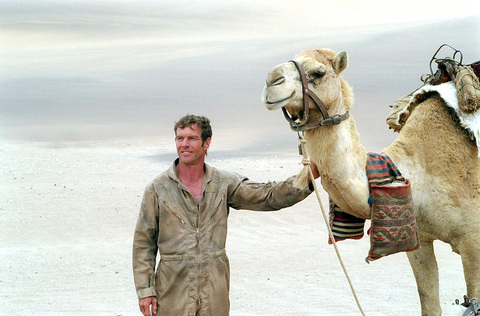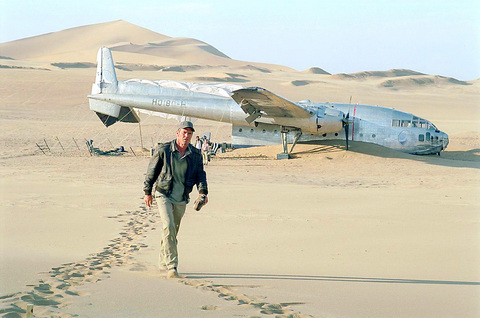Flight of the Phoenix, a moth-eaten stranded-in-the-desert yarn that throws in every cheap trick in the manual to pump up your heartbeat, is so manipulative that the involuntary jolts of adrenaline it produces make you feel like a fool. Watching it is the equivalent of being strapped on a treadmill and forced to trot, or of having the soles of your feet tickled; you may laugh, but it's not funny.
The film is a rickety update of the far superior 1965 movie, directed by Robert Aldrich, with James Stewart and Richard Attenborough leading an all-star cast. The setting has been moved from the Sahara to the Gobi Desert. And the revamped characters make up a cunningly chosen and unlikely mosaic of types that include a pretty woman (Miranda Otto), a one-eyed African-American guitarist (Kirk Jones), a Mexican-American chef (Jacob Vargas) and a Saudi (Kevork Malikyan). Otto's character, Kelly, belongs to the new breed of action-heroine: beautiful and unsmiling, she runs a Mongolian oil rig that is shut down in the movie's opening scene.

PHOTO COURTESY OF FOX FILMS
Shepherding the brigade of newly unemployed oil workers back to civilization is Capt. Frank Towns (Dennis Quaid), a hard-bitten cynic who couldn't care less about his human cargo. Rather than turn back the aircraft when it heads into a sandstorm, he tries to fly over and around it.

PHOTO COURTESY OF FOX FILMS
As the plane breaks apart in the air (its tail falls off, and it loses a propeller and its communications equipment), it roars to earth in one of the longest, most overproduced crash landings ever filmed. (For how to do it right, see Cast Away.)
Quaid, who growls through the movie like an attack dog preparing to spring, maintains an expression of such unalloyed gloom that his clenched mouth resembles an inverted smile button. The movie takes what little pleasure it can from admiring this 50-year-old star's sculptured abdominals when he takes off his shirt.
After the plane crashes, the stranger among the survivors, a creepy martinet with a high, piping voice and the suspiciously nerdy name of Elliott (Giovanni Ribisi), announces that he's an aircraft designer who has figured out a way to construct a getaway plane from the remains. (Hardy Kruger played the same role in the original.) The power struggle that continues for the rest of the movie pits brains (Elliott) against brawn (Frank).
The officious little aeronautics nut whose hair is dyed blond insists on being the unchallenged boss, entitled to an extra share of water, which is in perilously short supply. After a rebellion, in which he nearly loses his life, his nastiest ploy is to force the survivors to grovel and plead with him to return to work.
Meanwhile, every obstacle, save an epidemic, that could foil the chances of rescue or escape conspires against them. Mountains of magnetic rock make navigation on foot with a compass impossible. Because it's July, the survivors have to work at night. When a fuel explosion destroys their source of firelight, they have to carry on in the blazing sun.
Strangely, we don't see much sweat, and these industrious worker bees also seem blithely unconcerned with sunstroke. Recurrent sandstorms and one anticlimactic electrical disturbance that releases a few raindrops along with lots of phony lightning arrive on schedule and always at the most inopportune moments. The one lost-in-the-desert cliche the movie avoids is a mirage of a mocha cappuccino on the horizon.
Finally, there are the local nomads, whose full hostility the movie holds in reserve until the very end. That's the laughable sequence when an entire desert army descends on horseback from the dunes just as the reconstructed (or, should I say, resurrected?) aircraft, now called the "Phoenix," is about to attempt its maiden flight.
Flight of the Phoenix was directed by John Moore, whose feature film debut, Behind Enemy Lines, had a lot more integrity. Scott Frank and Edward Burns, who co-wrote the screenplay, have also done far more substantial work.
The dialogue here consists of filling in slots with attitudinal sound bites. Typical is a big, blustery speech that says that if you can't give people someone to love, give them something to hope for, and failing that, something to do. That's how the job of building the "Phoenix" gets under way. Doing something is better than doing nothing.

May 18 to May 24 Pastor Yang Hsu’s (楊煦) congregation was shocked upon seeing the land he chose to build his orphanage. It was surrounded by mountains on three sides, and the only way to access it was to cross a river by foot. The soil was poor due to runoff, and large rocks strewn across the plot prevented much from growing. In addition, there was no running water or electricity. But it was all Yang could afford. He and his Indigenous Atayal wife Lin Feng-ying (林鳳英) had already been caring for 24 orphans in their home, and they were in

On May 2, Chinese Nationalist Party (KMT) Chairman Eric Chu (朱立倫), at a meeting in support of Taipei city councilors at party headquarters, compared President William Lai (賴清德) to Hitler. Chu claimed that unlike any other democracy worldwide in history, no other leader was rooting out opposing parties like Lai and the Democratic Progressive Party (DPP). That his statements are wildly inaccurate was not the point. It was a rallying cry, not a history lesson. This was intentional to provoke the international diplomatic community into a response, which was promptly provided. Both the German and Israeli offices issued statements on Facebook

President William Lai (賴清德) yesterday delivered an address marking the first anniversary of his presidency. In the speech, Lai affirmed Taiwan’s global role in technology, trade and security. He announced economic and national security initiatives, and emphasized democratic values and cross-party cooperation. The following is the full text of his speech: Yesterday, outside of Beida Elementary School in New Taipei City’s Sanxia District (三峽), there was a major traffic accident that, sadly, claimed several lives and resulted in multiple injuries. The Executive Yuan immediately formed a task force, and last night I personally visited the victims in hospital. Central government agencies and the

Australia’s ABC last week published a piece on the recall campaign. The article emphasized the divisions in Taiwanese society and blamed the recall for worsening them. It quotes a supporter of the Taiwan People’s Party (TPP) as saying “I’m 43 years old, born and raised here, and I’ve never seen the country this divided in my entire life.” Apparently, as an adult, she slept through the post-election violence in 2000 and 2004 by the Chinese Nationalist Party (KMT), the veiled coup threats by the military when Chen Shui-bian (陳水扁) became president, the 2006 Red Shirt protests against him ginned up by